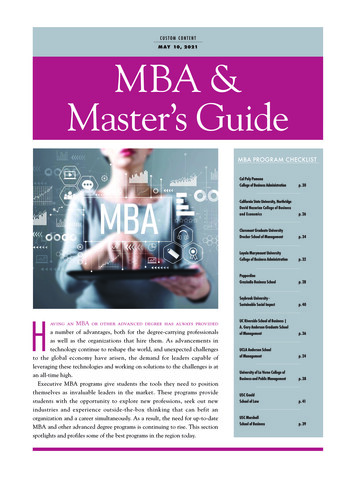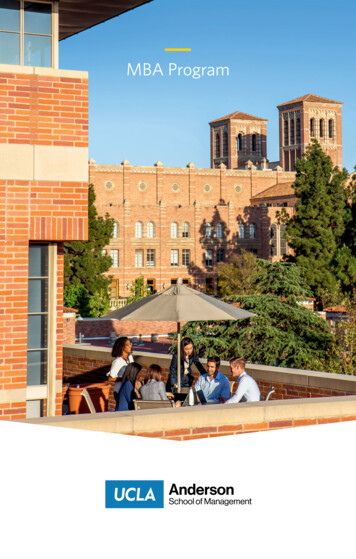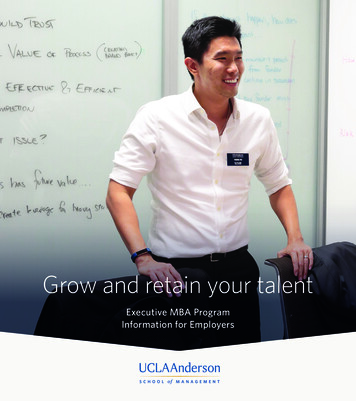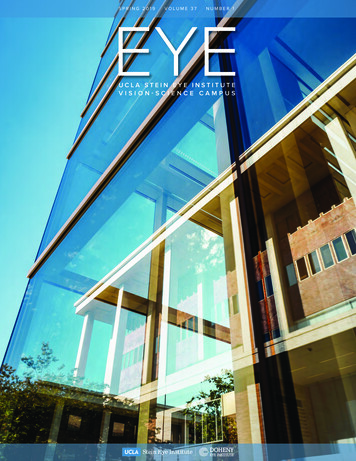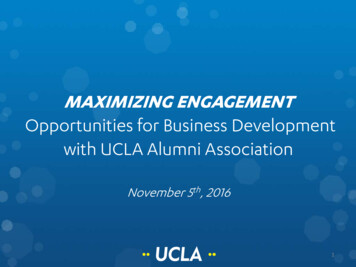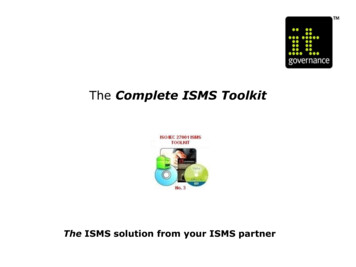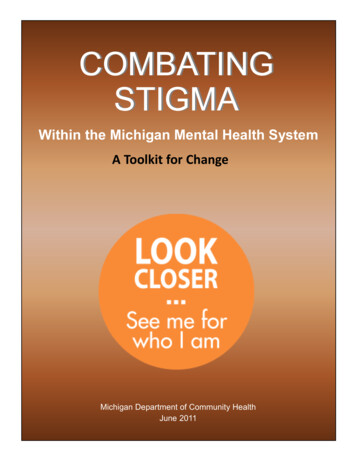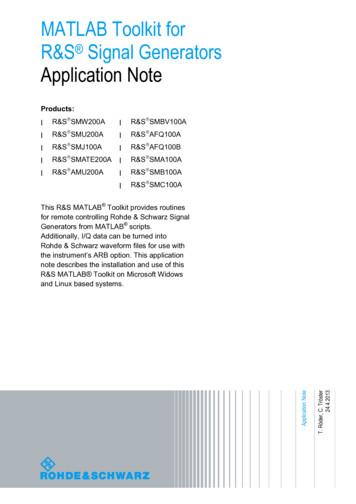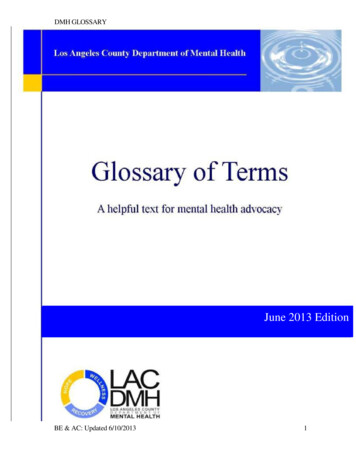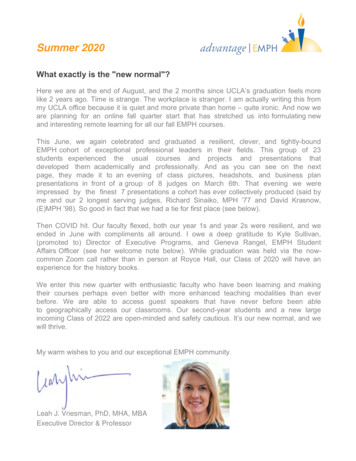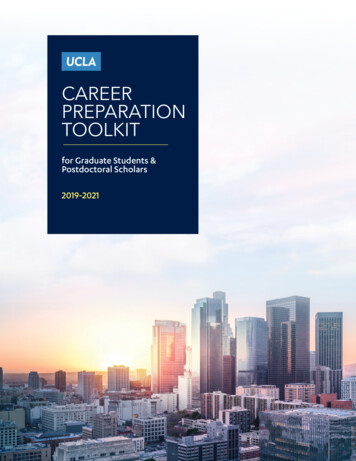
Transcription
CAREERPREPARATIONTOOLKITfor Graduate Students &Postdoctoral Scholars2019-2021
Resources & Services02
Career Preparation ToolkitWelcome MessagePreparing for your future requires focus and planning. The UCLA CareerPreparation Toolkit for Graduate Students and Postdoctoral Scholars is designedto help you think critically about how to navigate a lifetime of career decisions.How to Use this GuideDesigned for master’s and doctoral students and postdoctoral scholars, theToolkit will help you develop strategies and evaluate options as you pursueyour goals.Regardless of your professional objectives, being able to communicate effectivelywith different audiences, lead and manage projects, and solve complex problemswill be valuable assets to potential employers. Assessment activities, sampleapplication documents, and professional etiquette tips are embedded throughoutthe Toolkit to help you build these key skills.In addition to providing this Toolkit, the Graduate Division and Career Centerpartner to deliver services for UCLA graduate students and postdocs. Weencourage you to use this Toolkit as a road map as you take advantage of theunique professional development events, employer/alumni networking sessions,and other resources and services designed just for you.We wish you continued success at UCLA and beyond!Christine WilsonDirector, UCLA Career CenterExecutive Director of UCLA Graduateand Career ProgramsRobin L. GarrellVice Provost for Graduate EducationDean, UCLA Graduate Division03
Table of ContentsWelcome MessageResources & Services036401 Career Development PlanningCreating My Development PlanTimeline Development Plan Part I0608Timeline Development Plan Part II1002 Analyze Your Skills, Strengths & ValuesOnline Assessments & ResourcesTransferrable Skills AnalysisSWOT Analysis121416Assess Your Professional Network1803 Career Exploration & Informational InterviewsInformational Interviewing19Career Experiences and Job Simulations04 Job & Internship SearchJob Search Methods & StrategyLeveraging Your LinkedIn Account04Job Search Action Plan28Job Search Resources29252622
05 Application Materials for Careers in Industry,Nonprofit & GovernmentPhD Resume Example32North Campus Master’s Resume Example34South Campus Master’s Resume Example3536Cover Letter TemplateCV vs. Resume6630Job Description & Tailored Resume ExampleActive Verb ListAcknowledgements,Index & Resource List384006 Application Materials for Careers in AcademiaCurriculum Vitae Template42Curriculum Vitae Example44Academic Job Sample DocumentsAcademic Cover Letter TemplateTeaching Statement474850Research StatementDiversity Statement525307 Interviewing & NegotiationSample Interview Questions54Structuring Interview Answers – CARR MethodThank You Email Template57Evaluating & Negotiating Job OffersHow to Negotiate56586205
Creating My Development PlanStep 1: Identify your professional development needs.Have a solid proficiency in this skill alreadyExpect to learn this skill from mentor or programNeed training or practice in this skillNeedSelf-Assessment & DevelopmentHaveNeedExpectCommunication SkillsHaveNeedExpectHaveCareer Path PreparationFor each skill, identify whether you:ExpectContinuing your professional development is critical at all phasesof your career. Consider your level of proficiency in the following listof core professional skills and in which areas you need to developduring this phase of your career.Exploring Career OptionsScholarly WritingWellness and Life BalanceAcquiring Career Experience(project, work, or volunteerexperience specific to atargeted career path)Oral PresentationAssessing Knowledge,Values,and Interests (to identifypotential career paths)Professional EtiquetteDigital Literacy (ability tofind, evaluate, produce,and communicate clearinformation on various digitalplatforms)Communicating with DiverseAudiencesPreparing ApplicationDocumentsNetworkingAssessing Transferable Skills(skills acquired during trainingapplicable to different careers)Financial Literacy (managingpersonal finance, investing,budgets, retirement, tax plan)Using Social Media topromote your research and/or careerJob and Internship SearchSuccess and Socialization inyour Program or DepartmentTransitioning from Training toa Professional CareerInterviewing SkillsNegotiation SkillsNeedExpectHaveNeedExpectScholarly Expertise & IntegrityEntrepreneurshipPedagogical Methods andTeaching PhilosophyCommand of DisciplinaryKnowledge/ScholarshipGrant WritingSyllabus and Course DesignBudget ManagementLeading and Facilitating ActiveLearningFamiliarity withInterdisciplinary Knowledge/ScholarshipTime ManagementAssessing Learning and SkillDevelopmentCommand of ResearchMethods in Field andAdjoining FieldsAdvising and Role ModelingCollaborative ResearchAssessing Effectiveness ofTeaching or MentoringStrategiesFamiliarity with t ManagementValuing and Promoting Diversity06Teaching & MentorshipHaveNeedExpectHaveProject Management,Leadership & CollaborationCareer Development PlanningCivility in Scholarly Exchangeand Pedagogy
Step 2: Identify training needs specific to your goal.For each goal, list additional skills or training neededand note whether you:Expect to learn this skill from mentor or programNeed training or practice in this skillAny additional skills, training,or experience neededExpectIdentify your research, academic, and training goalsNeedNow, consider your professional goals during your trainingcareer at UCLA and your professional goals in pursuing a futurecareer path. Consider what additional skills and training you mayneed to meet those goals, beyond those identified in Step 1.E.g. Prepare for presenting thesis work at seminars and conferencesJoin toastmasters groupE.g. Expand my network of mentors beyond my faculty advisorTake networking workshopExpectNeedAny additional skills, training,or experience neededIdentify your career and career path exploration goalsE.g. Develop some experience in my career path of interestDo job simulation exercisesE.g. Find opportunities to network with professionals in my fieldJoin professional societyCareer Development Planning07
Timeline/Development Plan - Part IUse this page to organize the skills you need to develop in order to achieve your professional goals. Grey text examplesdemonstrate some activities you may want to consider usingEarly Stageh Create & update a LinkedIn profileh Attend career panels and conferencesto explore various career pathsMiddle Stageh Update CV and Resumeh Conduct informational interviewsto identify specific mentorsas neededCareer Path Preparationh Join a journal club to gainexposure to a variety of scholarlypresentation stylesh Present your research atdiscipline specific conferencesh Attend training workshops inCommunication Skillspublic speakingh Write an IDP and discuss it withyour mentorSelf Assessment &Development08Career Development Planningh Stay healthy with rest, exercise,diet, and recreation
Divide the remaining time in your program into early, mid, and late stage. Use the “Ongoing” column for training that willstart or continue past the end of your programLate Stageh Tailor application documents for specificjob applicationsOngoingh Expand your professional networkh “Activate” your professional network to leteveryone know your career interestsh Schedule a mock job talk with other graduatestudents in your department for feedbackh Discuss long-term career goals with yournetwork of mentorsh Reflect on your career goals and values annuallyCareer Development Planning09
Tmeline/Development Plan - Part IIDivide the remaining time in your program into early, mid, and late stage. Use the “Ongoing” column for training that willstart or continue past the end of your programEarly Stageh Identify and join a student grouph Apply for extramural fundingMiddle Stageh Join a departmental orcampus committeeh Volunteer to plan an event inyour departmentProject Management,Leadership &Collaborationh Attend teaching workshopsand seminarsh Join the GraduateUndergraduate Mentoringprogram (GUM) to mentor anundergraduate studenth Discuss opportunities forTeaching & Mentorshipincreased teaching responsibilitywith your advisorh Start a teaching portfolioh Complete coursework and examsh Propose and defendresearch prospectush Complete Human SubjectsProtection TrainingScholarly Expertise& Integrity10Career Development Planning
Late StageOngoingh Take on a formal leadership orh Reflect on your leadership philosophyh Reflect on your teaching philosophy and drafth Maintain a teaching portfoloioh Complete final dissertation workh Stay up to date on current field-specific researchsupervisory rolea teaching statementCareer Development Planning11
Online Assessments & ResourcesChoosing your future career path is a very complicated decision that will continue to evolve throughout your professionallife. Career assessment tools help you identify your strengths and skills, understand your work and communication style,and reflect on your core values.You can access the following tools online or with the help of a career counselor.Life Values Inventory Online (LVIO)Individual Development Plan sciencecareers.orgwww.imaginephd.comLVIO was developed to helpindividuals and organizations clarifytheir values and serve as a blueprintfor effective decision-making andoptimal functioning.MyIDP is a career development andplanning tool for biomedical scientists,though it can be adapted forSTEM disciplines.MyIDP provides:Imagine PhD is a free online,confidential career exploration andplanning tool for PhD studentsand postdoctoral scholars in thehumanities and social sciences.Use ImaginePhD to:h Exercises to help you examineyour skills, interests, and valuesh Self reflect on career-related skills,interests, and valuesh An algorithm to help you identifywhich careers best fit your currentskills and interests from a list of 20scientific career pathwaysh Explore careers paths thatPhDs in humanities and socialsciences pursue and morethan 450 curated, job-specificresources including job boards,sample resumes and PhD profilesh The program is comprised of5 steps including an assessmentportion and results andstrategies sectionh A tool for setting strategic goalsfor the coming year, with optionalreminders to keep you on trackh An opportunity to help map out orframe your career developmentplans, skills and interests whenmeeting with your facultyadvisor or PI12Analyze your Skills, Strengths & Valuesh Map out next steps for degreecompletion, career andprofessional development successThe ImaginePhD project is poweredby the Graduate Career Consortium(GCC).
Graduate Student & Postdoctoral Scholar Professional Development WebsiteThe UCLA Professional Development website is a collaborative project of UCLA campus units representing the interestsof graduate students and postdoctoral scholars at UCLA. We provide a calendar of workshops, speakers and presenterson and off campus who can provide insight and expertise on professional and career development topics.https://grad.ucla.edu/careerhub/h Subscribe to the RSS feed for upcoming eventsh All professional development events across campus are posted hereh Individual Development Plan information for students, postdocs and facultyh Versatile PhDh Opportunities unique to graduate students and postdocsVersatile PhDThe oldest, largest online community dedicated to nonacademic and non-faculty careers for PhDs in humanities, socialscience and STEM fields. UCLA Career Center and The Graduate Division hold a subscription to this site where graduatestudents and postdocs can access premium content and use the site to network with fellow PhDs in a range of careerpaths, look at sample application documents, and participate in panel discussions. A few additional ways to use the siteare listed belowwww.Versatilephd.comh To access premium content, you will need to log in through the UCLA Career Center website or the Graduate Studentand Postdoctoral Scholar Professional Development Websiteh Discover interesting career paths – Use the PhD Career finderh Consult the communityh See job listings appropriate for PhDsh Network with successful PhDs nationwideh Attend local meet upsHandshakeHandshake offers graduate students and postdocs a personalized, user-friendly interface to findskill specific jobs and internships, register for professional development events, and employerrecruitment opportunities.Through Handshake, Graduate Students can schedule graduate career advising and graduatewriting appointments.career.ucla.edu/handshakeGraduate Students & Postdocs can.h Explore thousands of jobs and internships and connect with employersh RSVP for professional development workshops, programs, and eventsh Discover jobs and internships in collections tailored towards your interestsh Track deadlines (job application, on-campus interviewing, events, etc.)h Explore and utilize online career resources like Vault, VersatilePhD, InterviewStream, and GoinGlobalAnalyze your Skills, Strengths & Values13
Transferable Skills AnalysisThe following list of transferable skills is a great start to identifying and prioritizing your skills gained as a graduate student,postdoc, and through other experiences. Using the list below, check the box next to the skills you feel confident using.Then evaluate the checked skills and underline those that you enjoy doing daily.Research & Information ManagementLocate and assimilate new information rapidly, applicable to a given problemUnderstand and synthesize large quantities of complex informationDesign research instruments (e.g., surveys) and effectively analyze resultsDevelop organizing principles to effectively sort and evaluate dataAnalysis & Problem SolvingClearly define a problem and identify possible causesComprehend large amounts of informationForm and defend independent conclusionsDesign an experiment, plan, or model that defines a problem, tests potential resolutions and implements a solutionCommunication Skills – Written & OralPrepare concise and logically written materials, for different audiences in different contexts: from abstracts to booklength manuscriptsEdit and proofreadOrganize and communicate ideas and complex information effectively in oral presentations to specialized and nonspecialized audiences in small and large groupsPersuade others in both written and oral format using logical argumentWrite effective grant and research proposalsInterpersonal & Leadership SkillsFacilitate group discussions or conduct meetingsTeach skills or concepts to othersWork effectively in teams, and collaborate on projectsNavigate complex or bureaurocratic environments effectivelyDiplomatically communicate and respond to positive or negative feedbackMotivate others to complete projectsBuild consensus among groups or individuals (e.g., with your department/committee)Effectively mentor subordinates and/or peers14Analyze your Skills, Strengths & Values
Organization & ManagementManage a project or multiple projects from beginning to endIdentify and establish goals or tasks to be accomplished in areasonable timelineOrganize and prioritize tasksAnticipate possible challengesMaintain flexibility in the face of changing circumstancesSupervision SkillsEvaluate others’ performance (e.g., grade exams or papers)Monitor or oversee the work of others in a lab or classroom, andprovide feedbackHelpful TipUse Your Transferable Skills toExplore Career Optionsgo to www.indeed.com andenter in one of the transferrableskill categories you haveidentified as a search termwith either your discipline, oran interest area.Self Management, Work Habits & Entrepreneurial SkillsMeet deadlines and manage competing prioritiesPerform under pressureWork independentlyAcquire funding (e.g., write grant/fellowship proposals) andmanage a budgetRank order the top five skills that you do well, and enjoy doing daily.1.2.3.4.5.Do any of these fall under a particular skill category?Analyze your Skills, Strengths & Values15
SWOT AnalysisIdentify a job description or career field that you are interested in pursuing. Using the following criteria, analyze yourselfand the external landscape for that career field. This will help you identify your strengths as a candidate, areas forimprovement, and networks/training opportunities to build toward this career.What do I do well?What is my biggest achievement?StrengthsWhat do others recognize me for?What personal qualities do Ipossess?What do I need to improve?WeaknessesWhat tasks do I typically avoid?What are my personal flaws?What are the trends in myprofessional industry/discipline?OpportunitiesWho can support me in achievingmy goals?What additional training orexperience is available to me?What are the obstacles?Threats16Who is competing for this kind ofjob/career?What macro-level changes mightimpact this career?(political, environmental)Analyze your Skills, Strengths & Values
Values WorksheetPlace the abbreviation for each of the values listed in the Work Values Inventory into one of the categories below toindicate how important each value is to you in your work.Highly ImportantModerately ImportantNot ImportantRank order the values in this category.Work Values Inventory1Achievement (ACH)Advancement (AVA)Adventure (AVE)Aesthetics (AES)Predictable work (PRE)Competition (COM)Early entry (EAN)Altruism (ALT)Creativity (CRE)Fairness (FAI)Health (HAE)High income (HIN)Home and leisure life (HLL)Independence (IND)Friendships at work (FRI)Interesting work (INT)Leadership (LEA)Exhibition (EXH)Lifestyle (LIF)Location of work (LOC)Mechanical and physical activity(MPA)Moral and religious concerns (MRC)Outdoor work (OUT)Physical appearance (PHA)People contact (PEC)Recognition (REC)Security (SEC)Status/prestige (STP)Variety (VAR)Work environment (WEN)Top Ten Work Values1.2.3.4.5.6.78.9.10.1 Lock, R. D. (2004). Taking charge of your career direction: Career planning guide, book 1 (5th ed.). Belmont, CA: Thomson/Brooks ColeAnalyze your Skills, Strengths & Values17
Assess Your Professional NetworkSurrounding yourself with a network of supportive individuals while a graduate student or postdoc is important to asuccessful experience. Rather than trying to identify one person to provide you with everything, develop a broad networkthat can serve to support you in many different areas. Use the chart below to evaluate your professional network,identifying multiple mentors and areas to develop.InternalProfessional DevelopmentExternalPeers/ColleaguesIntellectual Community/ResearchExternal CollaboratorsFacultySafe SpaceSupportive lyEmotional Support/Well BeingOtherOrganizational Groups18Analyze your Skills, Strengths & ValuesSupportive Individuals121212121212121212121212
Informational InterviewingInformational Interviews are 20-60 minute long conversations for you to ask questions, listen, and learn aboutorganizations, career paths, and industry trends from a professional in a field of interest. This is also an excellent way toexpand your network in a particular industry, and gain more nuanced information about a career or organization.This is not the same as a job interview, so use the time to listen and learn.When you reach out to a potential contact, communicate these three things:1.Why you are reaching out: What would you like to learn about them? It is best to be brief in your explanation.2.Why THEY are the best person for you to learn from: What makes them unique in their field? What about theircareer, position, or work intrigues you?3.What you are asking for: How much time will you need? Do you want to meet in person, through Skype, or byphone? Offer times to meet, but indicate that you can adjust to their schedule. Ask for 20-30 minutes of their time.Sample Informational Interview Request (Email)Dear Dr. ,I am a current (PhD Student/Postdoc) at UCLA in the BioengineeringDepartment, and I came across your name while browsing the UCLALinkedIn alumni group. Over the past 6 years my research has beenfocused on the use of nanotechnology in medical devices. Althoughthis work has been gratifying, I am now seeking to shift my career intoscience policy.If possible, I would like to learn more about your work in science policyat AAAS. The opportunity to learn about your career trajectory, andany advice you might be willing to share regarding steps I could starttaking now would be greatly appreciated. If you are available for 20-30minutes in the next month we could meet over coffee (my treat), Skype,or talk by phone. I’m typically available Monday-Wednesday 9am-12pm,but am happy to meet when it’s most convenient for you.Helpful TipDo not take it as a rejection ifthe contact offers to chat viaphone when you requested an inperson meeting. Remembertheir schedules are busy.Thank you and I look forward to hearing from you.Sincerely,Jillian EngineerCareer Exploration & Informational Interviews19
Sample Informational Interview QuestionsCareer Explorationh What are your major responsibilities?h What is the most interesting project you haveworked on?h What is the most/least rewarding aspect of your job?h Would you choose this career again?h What is a typical day like, or what does an averagework week involve?h What is the most common career path?h What obligations are expected of you outside of theactual job?h What are some lifestyle considerations for thiscareer field?h What are some common entry-level positionsin the field?h What kind of salary range and benefits could an entrylevel position expect to receive? NOTE: You are notasking for their specific salary!h What kind of individual (skills/personality) would be bestsuited for these entry-level positions? What types ofpeople typically do well in this field?h What are the most important factors used when hiring?h What is the best educational preparation for a career inthis field?h Which classes and experience would be most helpful toobtain while still in my degree program?h How high is turnover?h How does one move or advance within theorganization?Job Search and Industry Knowledgeh How do people find out about open positions in this field?h What types of skills and experience should I emphasize on my CV or resume?Helpful Tiph What do you think this industry will look like in 10 years? How is it changing?h How do you see jobs changing in the future?h Which professional journals or organizations would you recommend that Iresearch to learn more about this field?h Who else do you recommend I talk with, and may I have permission to useyour name?If you have done researchin preparation of this interview,demonstrate that by thequality and relevance of thequestions you ask.Specific questions that demonstrate your research on the person, field or industry:h How did your research background inh What are the pros and cons of working onh How does your research background onh Would you suggest (field specifichelp you in your job search?come into play, if at all, in your current position?h How did your experience in betterprepare you for this position?20Career Exploration & Informational Interviewsproject?experience) will help in this position?
Sample Thank You Email (Follow - up)After you have met with the professional or alumni and had a chance to learn more about the position, industry or field,your next step is to FOLLOW UP with them using a thank you email or hand written note. You should always thankpeople for their time, even if you have decided you don’t want to pursue careers in that direction. You never know whereyour next opportunity will come from and establishing a professional network is key to navigating successful careerchoices throughout your professional life.Thanking someone for their time is the easiest way to follow up, communicates professionalism, and is an opportunity toplant seeds for future interactions.When following up with an alumni or professional, communicate these three things:1.Thank them for their time and any specific resources, tips or contacts they shared highlighting what you hadin common.2.Demonstrate how you plan to use their advice, or share additional resources that are related to your conversation.3.Do not ask for a job, or send your resume unless it was something they offered during your meeting. You are stillbuilding a relationship and asking for a job is premature.Dear Dr. ,Thank you for meeting with me last week to learn about your career atAAAS, and the kinds of projects you have had the opportunity to workon. Our discussion helped me think about my doctoral work morebroadly, and I took your advice and reached out to your colleague, Dr.at RAND – we are meeting next week. Your detailed informationconcerning the AAAS Fellowship program was really helpful, and I planto apply for the fellowship when it opens next month.I appreciate your willingness to meet with me, and hope I can have theopportunity to return the favor in the future.Sincerely,Helpful TipAlways follow-up with an emailor hand written thank you note.Even if you feel you won’t reachout to this individual again, younever know where your nextopportunity may come from.Highlight what you havein common or learned fromthem and acted on whenfollowing up. It makes youmore memorable.Kelly EngineerCareer Exploration & Informational Interviews21
Career Experiences and Job SimulationsGaining experience by working on a project in a particular industry is one of the best ways to explore career options.However, as a graduate student or postdoc there are significant barriers around time, funding, and experience that canmake committing to an internship challenging. We have identified some low risk opportunities to help you “try work” thatinvolve minimal time commitments and allow you to reflect on how much you actually enjoy the work.Challenges & CompetitionsCrowdsourcing online platforms provide opportunities for organizations to pose problems and users to solve thoseproblems for incentives ranging from cash rewards to on-site interviews. Pay attention to fine print on crowdsourcingsites, including:h Intellectual Property – who owns your ideas if you participate, and at what point do your ideas become the intellectualproperty of the organization posing the idea? The most reputable sites either never own your idea, or own your ideaonly if you win the competition. Consult with the Technology Development Group and your lab director regardingthe complexities of intellectual property before you participate, too. In some cases—and especially if the work on acrowdsourcing platform is similar in scope to your research at UCLA—the university, your lab, or a funding agency mayalready have rights to your work product.h Fair Compensation – be sure the work on these platforms is worth the effort, and understand exactly what thecompensation for your work will be before you participate. In some cases, prize money is awarded only to winningideas. In other cases, each bit of work performed is compensated. And some crowdsourcing sites – particularly workfor nonprofits and government agencies – do not provide any compensation at all. Even if the pay is not great, though,determine if the work experience will be useful to you for building a portfolio for future employment or learning newskills.Example of Using a Competition Experience on Your Resume:Jaime Smith112211 Westwood Blvd Los Angeles, CA 91234 310.123.4567 JSmith@biology.ucla.eduAwards SectionFirst Place, HUD Innovation in Affordable Housing Student Design & Planning Competition. Challenge.gov( 10,000)Project Leadership & Management ExperienceProject Lead, Team Houses4People – challenge.govFall 20152018 HUD Innovation in Affordable Housing Student Design & Planning Competition Initiated and led a multidisciplinary team of 5 researchers in the development of an affordable urbandesign for the US Department of Housing and Urban Development (HUD). Proposed a business plan for a novel solution driven by large-scale 3D printing technology thatreduced construction cost by 30% to HUD executives and community stakeholders.22Career Exploration & Informational InterviewsResume TipsWinning solutions canbe cited as an awardand experience,whereas solutionsthat don’t win canstill be cited asexperience or projectwork
Some Crowdsourcing PlatformsPlatformURLDescriptionDisciplinary ExpertiseInnoCentivewww.Innocentive.comFeaturing Research &Development problemsposed by companies andgovernment agencies.Natural Sciences, Biomedical Sciences,Social Sciences, Business, TechnologyKagglewww.Kaggle.comFocused on Data Scienceand analytics with jobpostings and onlinelearning modules.Machine Learning, Python, DataVisualization, Data Mining, SQL, R, DeepLearning ModelsTop Coderwww.Topcoder.comBusinesses posedesign, code anddigital challenges.Visual Design, Code Development andData Science ProjectsChallenge.govwww.Challenge.govFederal agenciescrowdsource ideas fromthe public and solveproblems with thinkersand doers from anyneighborhood and fieldof expertise.Technology, Public Input, Creative,Scientific, Policy, Public Health,Data Science, Ideation, Defense,Biomedical SciencesMind Sumowww.Mindsumo.com/challengesEmployers post microchallenges, compensatewinning solutions andrecruit employees fromsubmissions.Challenges includeideation, implementationand insights.Business, Humanities & Arts, ComputerScience, Food Science, Math andSciences, EngineeringCareer Exploration & Informational Interviews23
InterSECT Job SimulationsInteractive Simulation Exercises for Career TransitionsOnline platform that allows PhD-level scientists and humanists, regardless of professional stage, to explore futurecareer options through true-to-life job simulation exercises that help individuals consider the following questions:h What are my professional interests and skills?h How do my interests and skills tra
The UCLA Career Preparation Toolkit for Graduate Students and Postdoctoral Scholars is designed . h A tool for setting strategic goals for the coming year, with optional reminders to keep you on track h An opportunity to help map out or frame your career development . h Individual Development Pla
